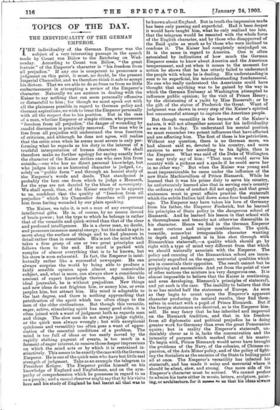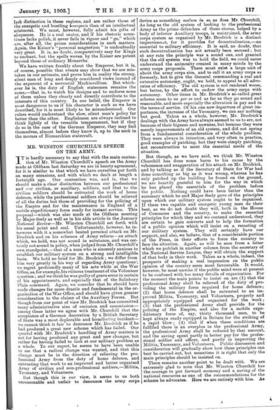TOPICS OF THE DAY.
THE INDIVIDUALITY OF THE GERMAN EMPEROR.
rur[ HE individuality of the German Emperor was the I. subject of a very interesting passage in the speech made by Count von Billow to the Reichstag on Wed- nesday. According to Count von Billow, " the great feature" of the Emperor's character is "his freedom from all prejudice." If any one is competent to pronounce a judgment on this point, it must, no doubt, be the present Imperial Chancellor, and we therefore think it safe to accept his dictum. That we are able to do so frees us from no little embarrassment in attempting a review of the Emperor's character. Naturally we are anxious in dealing with the Kaiser to say nothing that can seem personally offensive or distasteful to him ; for though we must speak out with all the plainness possible in regard to German policy and German aspirations, we wish to treat the Emperor personally with all the respect due to his position. But in the case of a man, whether Emperor or simple citizen, who possesses "freedom from all prejudice," the danger of wounding by candid discussion is practically removed. The man who is free from all prejudice will understand the true function of criticism, and although he does not agree, will realise that the critic even when he seems most severe is only per- forming what he regards as his duty in the interest of a truthful interpretation of human character. We shall therefore make no further apology for saying exactly how the character of the Kaiser strikes one who sees him from outside,—one who has no direct personal knowledge, but who judges him as an historical character is judged, i.e., solely on " public form " and through an honest study of the Emperor's words and deeds. That standpoint is probably the best one from which to judge a Monarch, for the eyes are not dazzled by the blaze of sovereignty. We shall speak, then, of the Kaiser exactly as he appears to us, confident that the quality of "freedom from all rejudice " which his Chancellor describes will prevent m from feeling wounded by our plain speaking.
The Kaiser, we take it, is not a man of any exceptional intellectual gifts. He is, of course, by no means devoid of brain-power; but the type to which he belongs is rather that of the versatile and quick-witted than that of the clear and profound intelligences. He is a clever man, no doubt, and possesses immense mental energy; but his mind is apt to move along the surface of things and to find pleasure in detail rather than in essentials. His is not the mind which takes a firm grasp of one or two great principles and follows them to the end. His mind is packed with samples of almost everything that is to be known, but his store is soon exhausted. In fact, the Emperor is intel- lectually rather like a successful newspaper. He can always surprise the world by being able to produce a fairly sensible opinion upon almost any conceivable subject, and, what is more, can always show a considerable amount of expert knowledge thereon. Again, like the ideal journalist, he is without prejudices. New things and new ideas do not frighten him, or annoy him, or even perplex him, but attract him. His mind is adaptable to the last degree, and there is nothing approaching that petrification of the spirit whieh too often clings to the men of the older civilisations. But though this versatile, eager, active, stimulating spirit has many good sides, it is often joined with a want of judgment both as regards men and things. The slow men do not always judge rightly, or the quick men always wrongly ; but with exceptional quickness and versatility too often goes a want of appre- ciation of the essential conditions of a problem. The mind is too full of ideas or too easily moved by the rapidly shifting pageant of events, is too much in a ferment of eager interest, to receive those deeper impressions on which the mind acts or by which it is restrained in- stinctively. This seems to be exactly the ca,se with the German Emperor. He is one of the quick men who have but little real strength of judgment. Take as an example the telegram to President Kruger. The Emperor prides himself on his knowledge of England and Englishmen, and on the sym- pathy of comprehension which he possesses in regard to us as a people; and a casual observer might say that by his visits here and his study of England he had learnt all that was to be known aboutEngland. But in truth the impression mado has been only passing and superficial. Had it been deeper it would have taught him, what he only realised too late, that the telegram would be resented with the whole force of the English character, and by those who disapproved of the Raid quite as much as by those who were inclined to condone it. The Kaiser had completely misjudged us. It is the same in regard to America. One is often astonished by indications of how much the German Emperor seems to know about America and the American temperament, and yet when it comes to the moment for action he shows that he has utterly failed to understand the people with whom he is dealing. His understanding is seen to be superficial, his misunderstanding fundamental. No one who really understood the Americans could have thought that anything was to be gained by the way in which the German Embassy at Washington attempted to influence public opinion; by the visit of Prince Henry; by the christening of a yacht by Miss Roosevelt; or by the gift of the statue of Frederick the Great. Want of judgment was shown in every step of the Kaiser's spirited but unsuccessful attempt to capture the American people.
But though versatility is the keynote of the Kaiser's nature, it will not altogether account for his individuality as we see it to-day. To understand his mental position we must remember two potent influences that have affected and are affecting him. The first of these is his patriotism. Without any question, there is no German more, we had almost said so, devoted to his country, and more anxious to serve her according to his lights, than is the Emperor. What was said of the Duke of Wellington we may truly say of him : " That man would serve his country with a pickaxe and a spade if he could serve her in no other way." But when the Kaiser was young and most impressionable he came under the influence of the new State Machiavellism of Prince Bismarck. While he learned that it was his prime duty to serve his country, he unfortunately learned also that in serving one's country the ordinary rules of conduct did not apply, and that great statesmen must in great affairs practise the statecraft which the subtle Italian laid down some four hundred years ago. The Emperor may have taken his love of Germany from his father, the Emperor Frederick, but he learned his principles of State policy in the .dangerous school of Bismarck. And he learned his lesson in that school with a thoroughness and tenacity not otherwise discernible in his character. Hence we find in the German Emperor a most curious and unique combination. The quick, versatile, somewhat irresponsible character wanting in depth and judgment is in him shot through with Bismarckian statecraft,—a quality which should go by right with a type of mind very different from that which we should naturally associate with the Emperor. The policy and cunning of the Bismarckian school are incon- gruously engrafted on the eager, mercurial qualities which are in essentials their opposites. The result cannot but be perplexing and anomalous. And yet from the point of view of other nations the mixture is a very dangerous one. It is almost impossible to believe that the Kaiser is continuing, and even developing, Bismarck's principles of statecraft, and yet such is the case. The inability to believe that this is so has misled half the statesmen of Europe. As soon as they begin to count upon the Emperor's apparent character producing its natural results, they find them- selves in contact with a pupil of Prince Bismarck. But if the foreign statesmen are deceived, so is the Emperor him- self. He may fancy that he has inherited and improved on the Bismarck tradition, and that in his freedom from all diplomatic and political prejudice he is doing greater work for Germany than even the great Pomeranian squire ; but in reality the Emperor's statecraft, un- deniably clever as it is, lacks the concentration and the intensity of purpose which marked that of his master. To begin with, Prince Bismarck would never have brought the problems of the Navy, of the colonies, of Chinese ex- pansion, of the Asia Minor policy, and of the policy of fight- ing the Socialists as the enemies of the State to boiling point all at once. The Emperor's versatility has infected his statecraft, and has made it noisy and mercurial where it should be silent, slow, and strong. One more side of the Emperor's character must be noticed. We cannot profess to admire his taste either in music, letters, sculpture, paint- • ing, or architecture. for it mama to us that his ideas ilinaw lack distinction in these regions, and are rather those of the energetic and bustling bourgeois than of an intellectual aristocrat. We must, however, fully admit his gifts of eloquence. He is a real orator, and if his rhetoric some- times lacks polish, it never fails in vigour and " go," which are, after all, the prime considerations in such matters. Again, the Kaiser's "personal magnetism" is undoubtedly very great. It is, no doubt, comparatively easy for Kings to enchant, but the spells woven by the Kaiser are potent beyond those of ordinary Monarchs.
We have written frankly about the Emperor, but it is, of course, possible that events may show that we are mis- taken in our estimate, and prove him in reality the strong, silent man of long and deeply considered views instead of the exponent of a mercurial Machiavellism. But which- ever he is, the duty of English statesmen remains the same,—that is, to watch his designs and to endorse none of them unless they clearly and directly contribute to the interests of this country. In our belief, the Emperor is most dangerous to us if his character is such as we have described, for it is most likely to be misunderstood. Our rulers would understand the slow, silent man's policy far better than the other. Englishmen are always inclined to think lightly of the versatile temperament, but if they do so in the case of the German Emperor, they may find themselves, almost before they know it, up to the neck in the morass of Bismarckian statecraft.







































 Previous page
Previous page